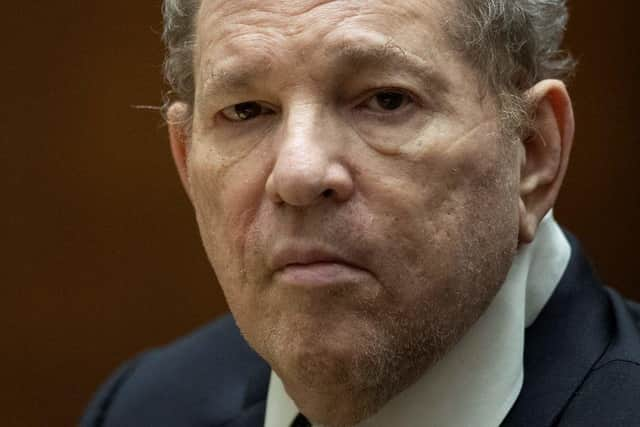Harvey Weinstein rape conviction overturned by New York's highest appeal court
Movie mogul Harvey Weinstein’s landmark 2020 rape conviction has been overturned and a new trial ordered.
The 4-3 decision by New York’s highest appeal court will see the women who spoke out against Weinstein set to give evidence for a second time in a retrial of the allegations against the producer.
Advertisement
Hide AdAdvertisement
Hide AdThe allegations against the 72-year-old sparked the #MeToo movement, which highlighted the issue of sexual harassment and sexual abuse of women in the workplace around the world.


The New York Court of Appeal found the trial judge had made a mistake in allowing prosecutors to call as witnesses a series of women who said Weinstein had assaulted them – but whose accusations were not part of the charges against him.
"We conclude that the trial court erroneously admitted testimony of uncharged, alleged prior sexual acts against persons other than the complainants of the underlying crimes,” the court’s decision said. “The remedy for these egregious errors is a new trial.”
Dozens of women came forward to accuse Weinstein of sexual harassment or assault, including actresses such as Ashley Judd and Uma Thurman, following an initial newspaper article in 2017. His New York trial drew intense publicity, with protesters chanting “rapist” outside the courthouse.
He has always claimed all sexual encounters were consensual.
In 2020, a jury convicted Weinstein, who is behind well-known films including Pulp Fiction and Shakespeare In Love, of two of five criminal charges – one count of criminal sexual assault in the first degree and one count of rape in the third degree. He was sentenced to 23 years in prison.
The decision to overturn Weinstein’s conviction, however, will not mean he will be released from jail, where he is held in the Mohawk correctional facility in New York state. A year ago, he was sentenced to 16 more years in jail for rape and sexual assault by a court in Los Angeles.
His lawyer, Arthur Aidala, had argued the extra testimony went beyond the normally allowable details about motive, opportunity, intent or a common scheme or plan, and essentially put Weinstein on trial for crimes he was not charged with.
Advertisement
Hide AdAdvertisement
Hide AdHe also claimed the trial judge’s refusal to remove a juror who had written a novel involving predatory older men was unfair, due to similarities to Weinstein’s case.
The court’s majority said: “It is an abuse of judicial discretion to permit untested allegations of nothing more than bad behaviour that destroys a defendant’s character, but sheds no light on their credibility as related to the criminal charges lodged against them.”
The reversal of Weinstein’s conviction is the second major #MeToo setback in the past two years, after the US Supreme Court refused to hear an appeal of a Pennsylvania court decision to throw out Bill Cosby’s sexual assault conviction.
Dissenting judge, Madeline Singas, wrote the majority in the Weinstein case was “whitewashing the facts to conform to a he-said/she-said narrative”, and said the Court of Appeals was continuing a “disturbing trend of overturning juries’ guilty verdicts in cases involving sexual violence”.
“The majority’s determination perpetuates outdated notions of sexual violence and allows predators to escape accountability,” Judge Singas wrote.
